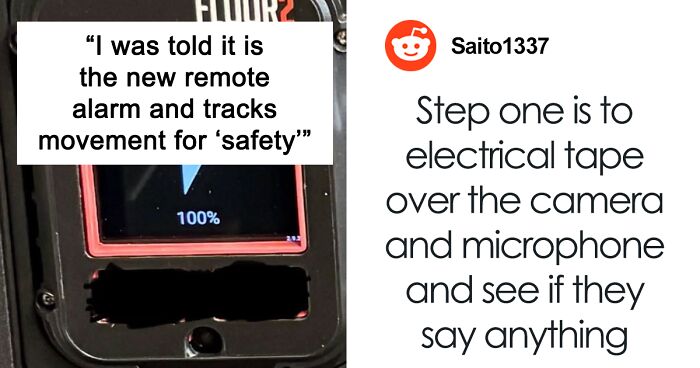
“My Work Gave Us New ‘Remote Alarms’ That We Must Carry At All Times”
Interview With ExpertMany people, if not everyone, value their privacy. However, with existing technology, it’s becoming harder to protect. We might not notice it, but we’re being monitored pretty much everywhere we go—streets, public transport, supermarkets, shopping centers, and even workplaces. And that’s without social media and various apps on our phones and computers.
Recently, redditor Coldbruskeee shared how his privacy was breached in a gas station where he works. The management introduced new “remote alarms” that should be used in an emergency. However, after a closer inspection, the employee found that the device had a camera and an audio recorder in it. Creeped out by the situation, he decided to share it, asking for advice.
Scroll down to find the full story and a conversation we had with Steven Chizen, a San Francisco Bay Area-based employment lawyer, who kindly agreed to tell us more about workplace privacy.
With current technology, it’s getting difficult to protect our privacy
Image credits: Engin Akyurt / Pexels (not the actual photo)
This man shared how new devices at work breached his own personal space
Image credits: Coldbruskeee / Reddit
Later, the author came back with an update
Image credits: Coldbruskeee
Image credits: Towfiqu barbhuiya / Pexels (not the actual photo)
Employee monitoring technologies have become more prevalent in the past few years
Employment lawyer Steven Chizen told Bored Panda, “Companies pay their employees wages. In return, they often feel entitled to control their employees as much as possible. Since more work happens electronically and remotely these days, out of the eyeshot and earshot of a direct supervisor, companies frequently rely on surveillance and monitoring software.”
He further explains, “There are many reasons for this, some of which are more valid than others. For example, a company might want to monitor emails to make sure employees are not sending confidential information to their personal accounts or external parties. Other times, companies simply act as a “helicopter parent” for employees, which often leads to a culture of fear among non-managerial workers.”
According to recent data, employee monitoring technologies have become more prevalent in the past few years. The Top10VPN report has found that searches for employee monitoring software rose by 75% in 2020 compared to 2019 and remained in high demand in 2021 and 2022. Looking into it deeper revealed that 50% of organizations use video surveillance as a way to monitor employees.
The most popular way to observe workers within American organizations in 2023 was by recording the websites they visited. Other ways to do that included app usage, time-tracking, and real-time screen monitoring. “Some companies track employee badge swipes so they can know exactly when their employees enter the building. Others monitor website traffic, emails sent, and even keystrokes on company-issued devices,” adds Chizen.
Most types of monitoring software now make it possible for employers to see everything on the desktop in real time, from keystrokes to browsing activity, emails, and chat apps. Express VPN has found that 73% of managers take it even further by storing staff calls, emails, or messages to supposedly evaluate their worker’s performance.
Experts attribute this bigger need for monitoring to the pandemic and the shift to hybrid work, as 85% of employers find it hard to believe that their workers are being productive while working from home. Kathryn Weaver, a partner at the law firm Seyfarth, also mentions the need to guarantee workplace safety and protect the company.
Image credits: fauxels / Pexels (not the actual photo)
All of this is happening with most employees not knowing
All of this is happening with most employees not knowing, as 62% report not being aware their activities are monitored. 33% of those who know believe that it negatively affects their mental health. They also admit feeling more anxiety and pressure to work longer hours.
Unfortunately, these aren’t the only downsides to surveilling employees. During the pandemic, employee identity theft and other fraudulent activities were on the rise due to the security gaps that came with hybrid work. “Previously, the edge of the network was very defined within a building, but now you have employees all over the place,” explains Elizabeth Harz, CEO of employee monitoring software Veriato.
However, not all employees are making peace with being monitored. ExpressVPN research has found that monitored workers were significantly more likely to take unapproved breaks and complete tasks slowly on purpose.
Most jurisdictions allow employees to monitor work devices, as long as they consent to it. But often, workers are unaware they agreed to it, as employee surveillance is a clause commonly located in the middle of employment contracts. “When you’re looking at your contract, you’re not looking for those clauses — you’re looking at how much am I going to get paid? What benefits do I have? You will probably skip over sections to do with data privacy because they’re not important to you at that point in time,” Weaver said.
“In California, workers maintain a reasonable expectation of privacy in areas of work that ought to be private, for example, a bathroom or lactation room,” says Chizen. “That said, employers have a lot of leeway to monitor employees’ electronic devices that are company-issued (phones, emails, and computers). Employers may not monitor devices that are strictly personal, not company-issued, and not used during working hours.”
To protect their privacy, workers should remember that management has access to everything they do on a work-issued electronic device, says the employment lawyer. “Employers should keep personal activities completely off of company laptops, phones, and VPNs,” he advises.
“Too often, I see employees who routinely use social media on their employer’s laptop, shop online during working hours from their employer’s device, or send company documents to their personal emails. While it is true that many employers simply don’t care if you do a little personal work from company devices, many do, and employees could be disciplined and/or terminated depending on the severity of the circumstances.”
The author provided more information in the comments
He received many reactions from readers and advice on what to do
•
Not Quite Done Yet!
Discover Your Competitive Edge
Subscribe Premium to Compare Your Stats with Others
More Premium features:
How did you score compared to others?
Your general stats:
| User | Result | Reward |
|---|---|---|
  | / 20 | |
  | / 20 | |

Making it mandatory for employees to carry a microphone and camera at all times doesn't sound legal, not even for American circumstances
If this isn't already illegal in the USA, it should be. It's ironic though, that the land of the free monitors its employees in this way. I remember seeing an Amazon-UK executive (an American) being grilled by a parliamentary committee about this kind of thing. Employees were being tracked in the UK, though less blatantly so. This is of course indisputably illegal.
Load More Replies...Most places it is illegal to film people in the bathroom. I say sue them.
I suspect that the actual legality here may be that the employee filmed themselves, but there's likely to be some kind of civil issue for failure to disclose the video capability. Possibly some criminal (labor law) issue about lack of disclosure, but I'm not confident that the employer put the camera in the bathroom in terms of what the relevant law(s) actually say.
Load More Replies...Making it mandatory for employees to carry a microphone and camera at all times doesn't sound legal, not even for American circumstances
If this isn't already illegal in the USA, it should be. It's ironic though, that the land of the free monitors its employees in this way. I remember seeing an Amazon-UK executive (an American) being grilled by a parliamentary committee about this kind of thing. Employees were being tracked in the UK, though less blatantly so. This is of course indisputably illegal.
Load More Replies...Most places it is illegal to film people in the bathroom. I say sue them.
I suspect that the actual legality here may be that the employee filmed themselves, but there's likely to be some kind of civil issue for failure to disclose the video capability. Possibly some criminal (labor law) issue about lack of disclosure, but I'm not confident that the employer put the camera in the bathroom in terms of what the relevant law(s) actually say.
Load More Replies...
 Dark Mode
Dark Mode 

 No fees, cancel anytime
No fees, cancel anytime 







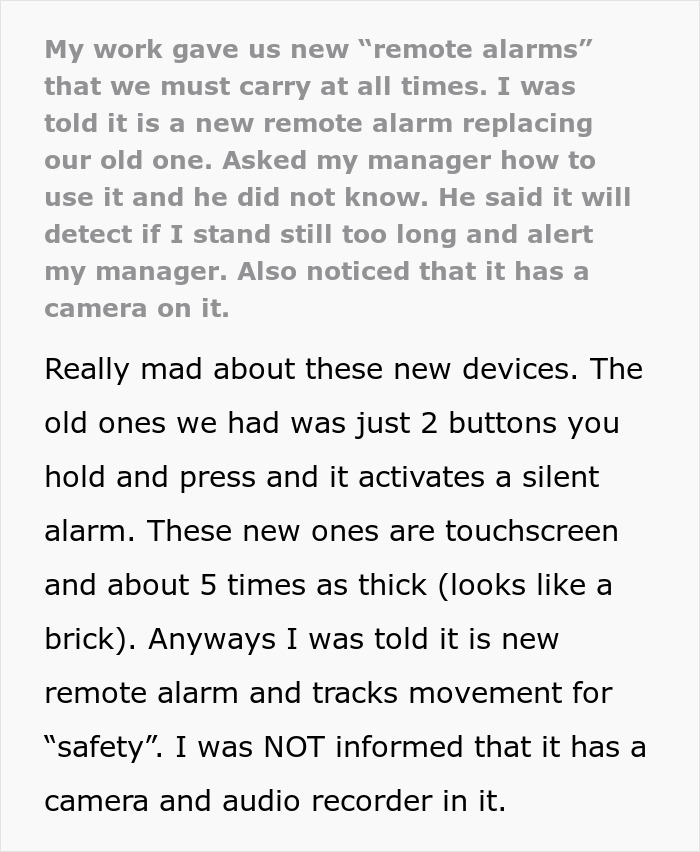
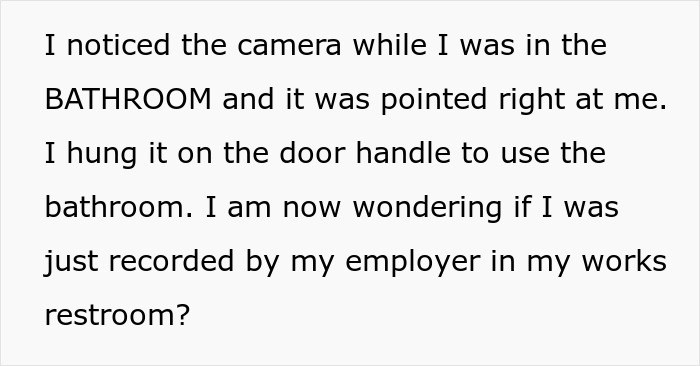
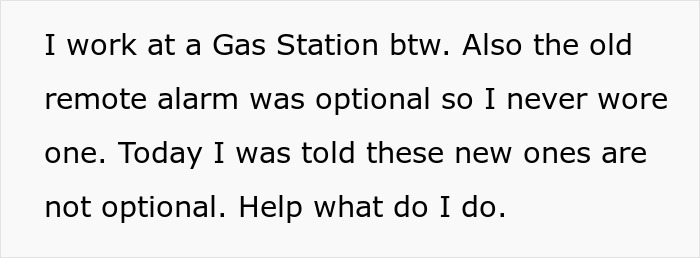


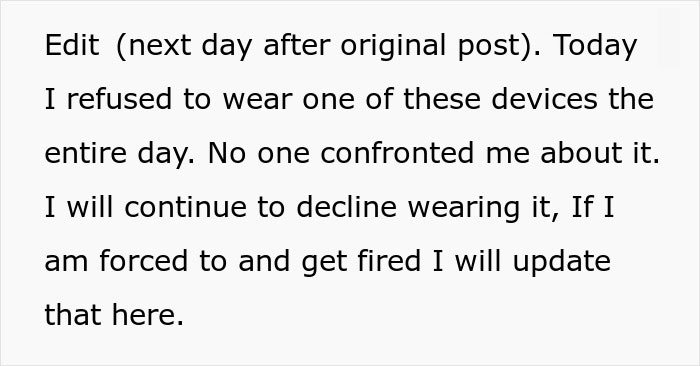
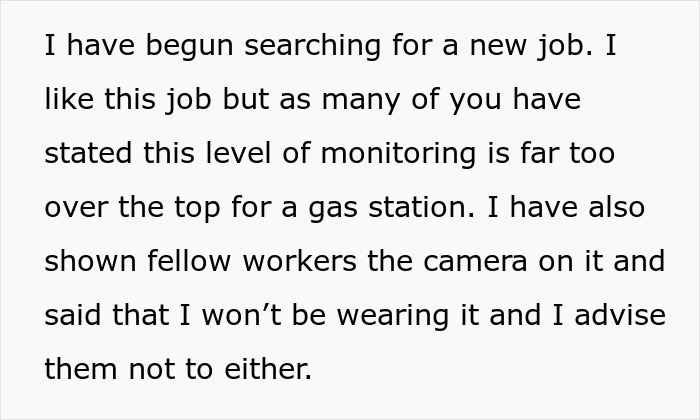
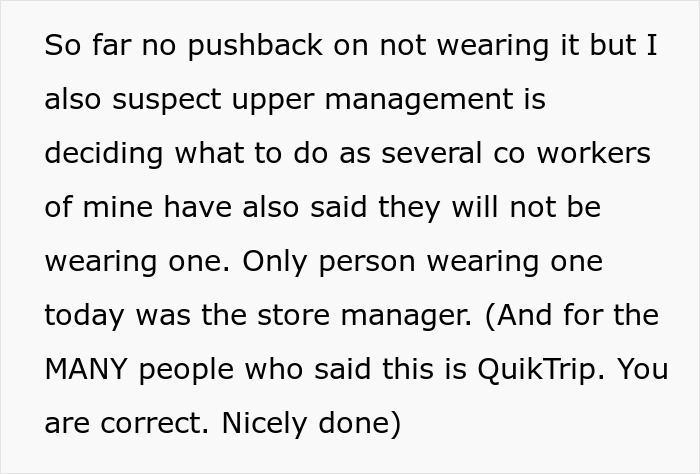
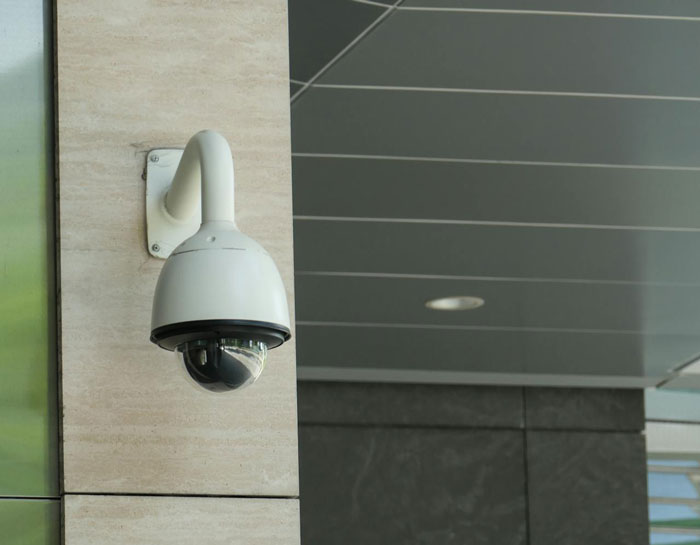

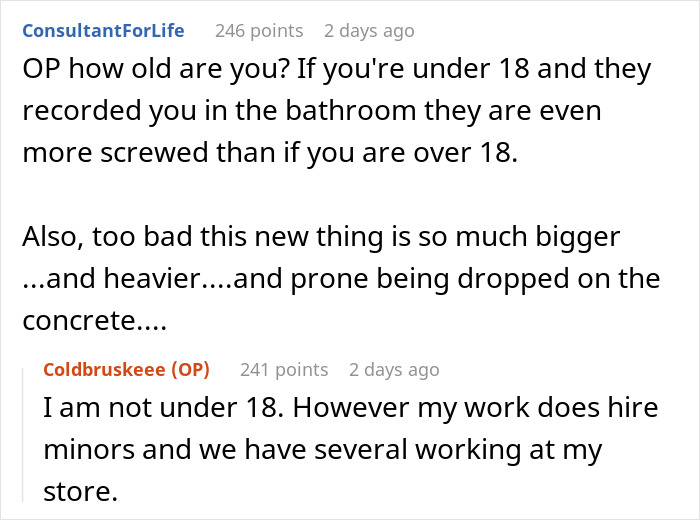
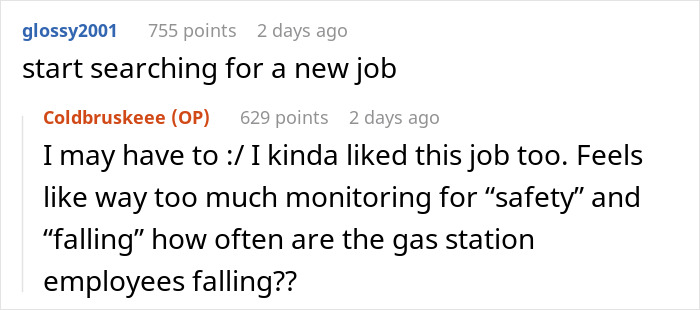
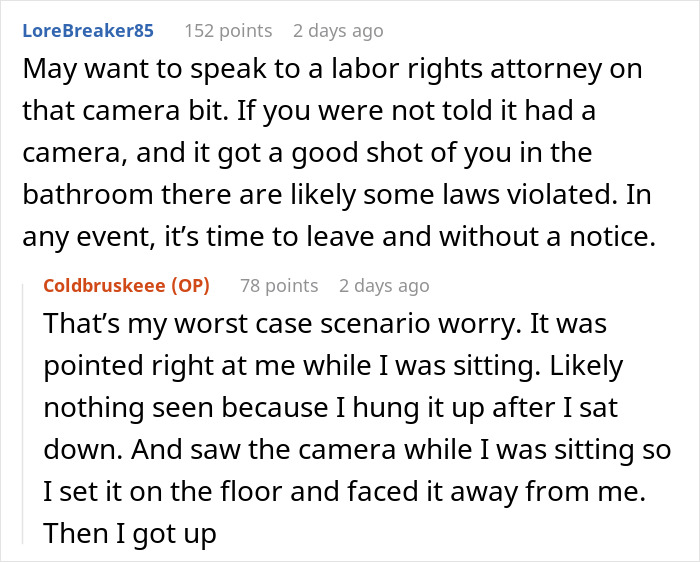
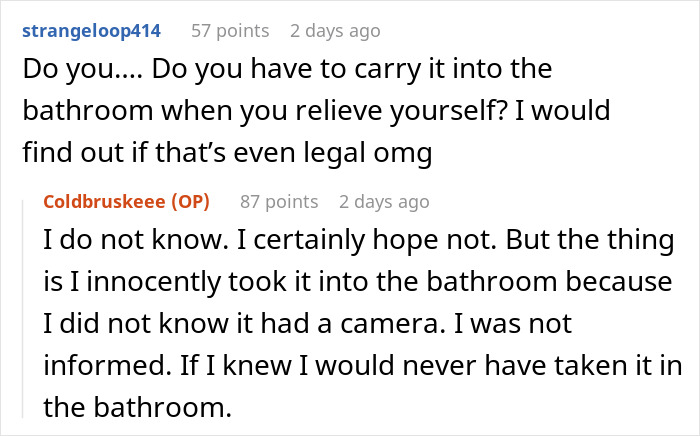


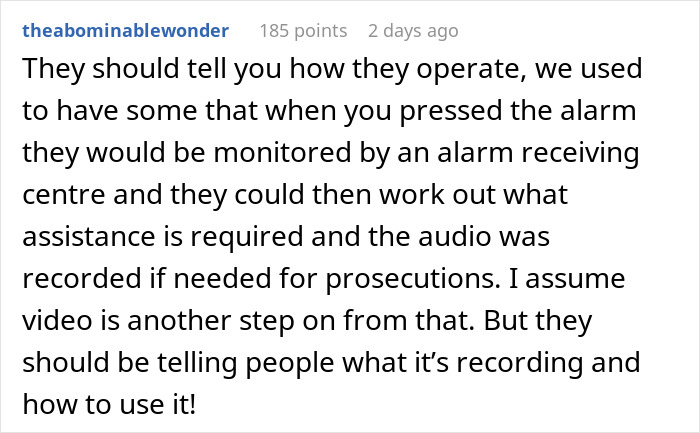


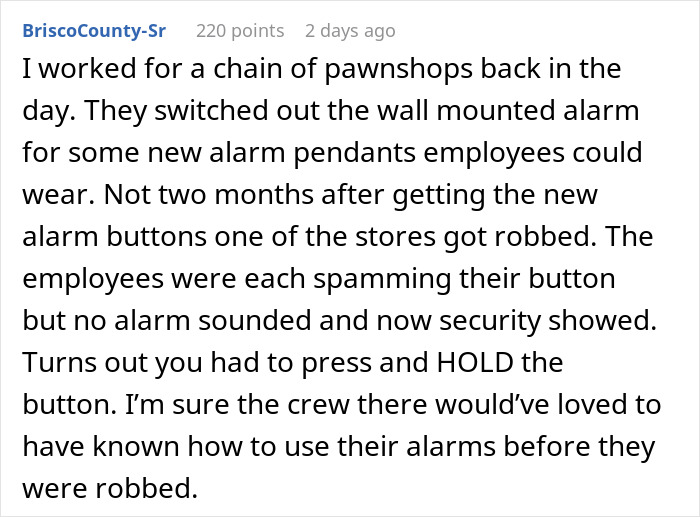
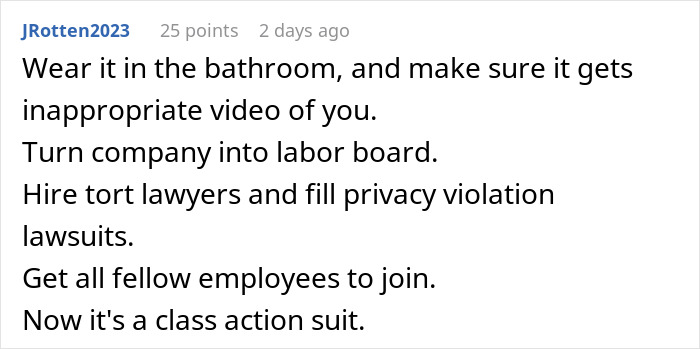

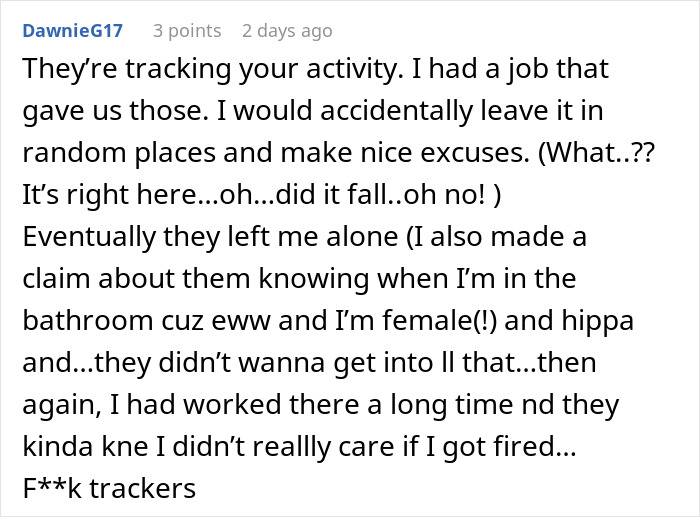












































57
37